Trading Day blog: live markets coverage; CBA under fire over brokers; plus analysis and opinion
The local bourse pared early losses to close slightly down as the bank inquiry continued to shine a light on bank behaviour.

Welcome to the Trading Day blog for Thursday, March 15.
Samantha Bailey 4.15pm: ASX dips as banks drag
The local sharemarket finished the session slightly lower as investors pulled back amid wariness about a potential trade war and as steel production curbs in China were lifted.
At the close of trade, the benchmark S&P/ASX200 had shed 14.5 points, or 0.24 per cent, to 5,920.8 points, while the broader All Ordinaries index dipped 15.05 points, or 0.25 per cent, to 6,027.6 points.
It came as global markets plunged after the US said it would take action against Indian export subsidies at the World Trade Organisation, reigniting trade war fears and as Chinese steel production curbs were lifted.
4.00pm: Toys ‘R’ Us files for bankruptcy
Toys ‘R’ Us Inc. has filed a motion seeking bankruptcy court approval to start a wind-down of its US business and liquidation of inventory in all its 735 US stores, including those in Puerto Rico.
“Toys ‘R’ Us will provide more details about the plans for the liquidation of its US stores and going out of business sales in the near term,” the Wayne, New Jersey.-based company said in a news release.
The company also said it is pursuing a going-concern reorganisation and a sale process for its Canadian and international operations in Asia and Central Europe, including Germany, Austria and Switzerland.
International operations in Australia, France, Poland, Portugal and Spain are considering their options in light of this announcement, the company said, including potential sale processes in their respective markets.
The company’s stores in all these international markets are currently open and serving customers.
Dow Jones Newswires
3.45pm: ACCC flags Aurizon sale concerns
The competition watchdog is worried Aurizon’s planned sale of its Queensland Intermodal business would give buyer Pacific National a stranglehold on freight haulage in the region.
Australian Competition and Consumer Commission chairman Rod Sims says the proposed sale would make Aurizon rival Pacific National the only operator of its kind to and from far north Queensland.
“We are concerned the proposed acquisitions would lead to increased prices and reduced service for freight hauled between Brisbane and far north Queensland,” Mr Sims said.
Samantha Woodhill 3.10pm: Pipeline for blockbuster IPOs drying up
Last year brought the highest number of successful ASX listings since the global financial crisis, but the pipeline for blockbuster IPOs is drying up, with just one major listing in the works.
According to analysis by Deloitte, 115 companies listed in 2017, compared to 97 the prior year and 97 in 2015.
The IPO market last year was dominated by small cap listings, which accounted for 75 per cent of listings by volume and this year looks to be no different, with just the Lattitude Financial as the only blockbuster ASX listing in the pipeline.
And despite the spike in listings last year, the IPO market only raised $6.7 billion in capital, 15 per cent lower on the prior year, due to investor caution on sizable deals, Deloitte national M&A leader Ian Turner said.
“Private equity firms were largely absent as they embarked on their investment phase,” he said.
But in spite of a slumped overall capital raising value last year and the absence of any big deals on the horizon, Deloitte is still optimistic for the remainder of 2018.
“Although increasing levels of volatility in the New Year tempered the resurgence in optimism temporarily, the market remains buoyant with a pipeline of IPO candidates for the foreseeable future,” the report said.
2.35pm: Banks drag market lower
The Australian share market is lower in afternoon trade, dragged down by falls in the big banks.
The benchmark S&P/ASX200 index was down 1.6 per cent at 2.30 AEDT on Thursday, with most sectors, bar mining stocks, trading either flat or weaker. Australian shares also suffered from a weak lead from the US where stocks fell after US President Donald Trump sought to impose fresh tariffs on China, intensifying fears of a trade war.
Disappointing data that showed US retail sales had fallen for a third straight month in February also weighed upon investor sentiment.
On the local bourse, the big four banks were between 0.8 per cent and 1.1 per cent weaker, with National Australia Bank the worst off, as hearings into the financial services royal commission continues.
Among the miners, Rio Tinto was 2.1 per cent higher and BHP was up 1 per cent.
Ben Butler 2.20pm: Calling out CBA scuppered broker’s appeal
A state manager for Commonwealth Bank told colleagues a mortgage broker’s appeal against being deaccredited by the bank should be refused because he spoke to the media about his case, the banking royal commission has heard.
Mark Harris spoke to industry publication Australian Broker and Fairfax Media about CBA’s decision to kick brokers who wrote few or no loans out of its system in February last year.
“Given Mark’s activity in the press I am not now sure he is someone we want to honour an appeal for,” Queensland state manager Cameron Baseley said in a February 24 email to colleagues, shown to the commission.
Mr Harris, who gave evidence about his experiences to the commission yesterday afternoon, was one of 100 brokers the CBA targeted for deaccreditation early last year.
CBA planned to give a total of 3500 brokers the boot but ditched the plan after an outcry from the industry.
Giving evidence today, the bank’s head of home loans, Daniel Huggins, said the bank instead decided to require extra education for brokers who write few loans.
Mr Huggins complained that “media attention was going down the path of CBA’s only doing this to encourage brokers to write more volume with them”.
“And that’s not what I was trying to do,” he told the commission.
However, counsel assisting the commission, Rowena Orr, QC, took Mr Huggins to a “reputational impact analysis”, prepared by CBA’s media team, that showed the bank was under pressure from stockmarket analysts to move home loan business from mortgage brokers to its more lucrative in-house team.
The bank’s response included “seeking to reduce the number of mortgage brokers that are accredited with us that are either inactive or provide very little business”, according to the document.
Mr Huggins said that “this is not how we thought about the deaccreditation project. We knew that we weren’t getting a huge amount of business from these brokers and therefore it wasn’t going to have a huge impact.”
He conceded the bank had a “broad objective” to move more business in-house but said this was not part of the deaccreditation project.
2.10pm: Asian markets extend losses
Asian markets continued a global sell-off Thursday and the dollar weakened as trade war fears return to the fore, with worries Donald Trump will go full-steam ahead with his “America First” protectionist agenda.
Investors are back on the ropes after the US said Wednesday it would take action at the World Trade Organisation against Indian export subsidies.
That came soon after it emerged Trump is considering tariffs on billions of dollars in Chinese tech and telecoms imports as he takes aim at alleged intellectual property breaches by Beijing.
The news saw a return to volatility after a few days of respite from last week’s controversial announcement of levies on steel and aluminium imports.
Tokyo ended the morning session 0.5 per cent lower, hit by strong yen. Hong Kong fell 0.8 per cent, Sydney and Seoul each slipped 0.3 per cent and Shanghai was off 0.1 per cent, while Singapore dropped 0.8 per cent. Taipei, Wellington, Jakarta and Manila were also sharply lower.
The greenback took a hit from the yen as trade war worries sent investors chasing into safe-haven assets, while a disappointing retail sales figure for February dented expectations the Federal Reserve will lift interest rates more than three times this year.
AFP
Eli Greenblat 12.45pm: 2,700 local Toys ‘R’ Us jobs at risk
More than 2,700 local jobs are in danger of disappearing after Toys ‘R’ Us in the US was placed into liquidation that will see all of its 885 stores in North America shut up shop and fears growing the retailer’s 45 stores in Australia could also be closed soon.
The first Australian Toys ‘R’ Us store opened in Australian in 1993 with the business also opening here Babies R Us outlets, but that could all come crashing down within weeks if the Australian operation follows its US parent into liquidation with the US company’s outlets in Europe and Canada likely to close.
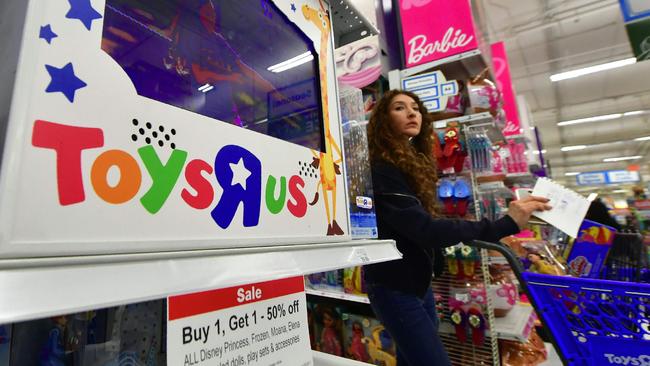
If Toys ‘R’ Us were to shutter its doors in Australia it would snuff out 2700 jobs and add its name to the long list of fashion retailer casualties over the last few years that has included the nation’s biggest independent shore store, Payless Shoes, Pumpkin Patch, Herringbone, Topshop, Rhodes & Beckett, David Lawrence, Live, and Marcs.
The Wall Street Journal reported overnight that Toys ‘R’ Us has struggled with more than $5 billion in debt from a leveraged buyout. It also was squeezed by competition from Amazon.com Inc. as more parents shop online, as well as discount retailers such as Walmart Inc.
In addition to shutting down U.S. operations, Mr. Brandon told staffers the company was likely to liquidate in France, Spain, Poland and Australia. It plans to sell its operations in Canada, Central Europe and Asia. The company is also trying to package its Canadian business with 200 U.S. stores and find a buyer, the CEO said.
Richard Gluyas 12.12pm: Banks could pay flat fee to brokers: Hayne
Royal commissioner Kenneth Hayne has floated the idea of banks paying a flat fee to mortgage brokers, regardless of the value of loan.
Commonwealth Bank’s executive general manager of home buying, Daniel Huggins, was giving evidence to the financial services royal commission this morning when Mr Hayne floated the idea.
Mr Huggins responded that the bank would have to be careful that a flat fee arrangement did not lead to excessive churn.
One of the topics under examination today is conflicts of interest that can create poor outcomes for customers.
Mr Huggins admitted under cross-examination by counsel assisting, Rowena Orr QC, that there’s an “inherent” conflict” with volume based payments for brokers.
He said CBA was now moving to “de-link” accreditation from the volume of loans referred.
If brokers were relatively inactive, Mr Huggins said they would have to undergo quality assurance training to ensure they could credibly talk about CBA products.
The royal commission also heard that brokers risk their relationship with CBA if volumes fall below $5 million.
Last December, CBA imposed a $350 limit on non-financial benefits paid to mortgage brokers per event, according to Mr Huggins.
Previously there was no formal policy in place.
12.00pm: CBA de-accredited 710 brokers for ‘inactivity’
CBA de-accredited 710 brokers in 2017, the bank’s executive general manager of home buying Daniel Huggins has told the royal commission.
At the start of 2017 the bank had 12,550-13000 accredited brokers.
“We de-accredited 710 brokers in 2017,” Mr Huggins said.
The bank had originally planned to de-accredit 2,500-3,000 brokers but after feedback from the market following the first 700 de-accreditations, Mr Huggins made the decision that ‘inactive’ brokers could undergo further training to avoid de-accreditation.
Prior to the de-accreditation program in 2017, brokers were only de-accredited when they submitted false or inappropriate activity or the broker was resigning and leaving the industry.
Last year the bank began a program to de-accredit brokers because they were inactive.
“They were not submitting applications and that meant that I and the team were unable to monitor any sort of quality,” he said.
Counsel assisting the commission, Rowena Orr, QC, put it to Mr Huggins that the brokers were de-accredited because they weren’t recommending enough CBA loans.
“You de-accredited them because they were not submitting enough CBA loans to their customers,” she said.
“That’s not right,” Mr Huggins said.
11.55am: Volume requirement for CBA brokers
CBA-accredited brokers have a requirement to complete four home loan applications and settle three home loans per six months, the royal commission has heard.
CBA’s executive general manager of home buying Daniel Huggins said the bank is not currently enforcing that requirement.
“We are not enforcing this, we haven’t systematically been enforcing this requirement,” he said.
Matt Chambers 11.50am: Newcrest doesn’t know when Cadia will restart
Newcrest Mining chief Sandeep Biswas says the company does not know when its flagship Cadia East gold and copper mine near Orange can restart after last Friday’s tailings dam wall collapse, which will mean 2017-18 guidance will not be met.
Government approvals for an alternative plan to put tailings in the old Cadia open pit, which is no longer mined, could take anywhere between one and six months, he said.
“We are unable to be specific right now on when we will return to production,” Mr Biswas said today on a conference call with analysts, adding he did not expect the company to meet full-year production guidance of between 2.4 million and 2.7 million ounces.
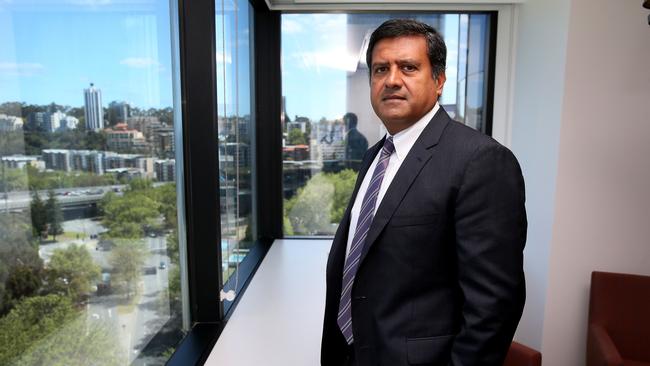
The miner yesterday declared force majeure on copper concentrate shipments from the mine, which is primarily an underground block-cave gold mine that produces copper as a by-product.
Mr Biswas said Newcrest was looking at alternatives to using the tailings dam, which stores mining processing waste.
These included putting tailings in the old and unused Cadia open pit, or restarting mining and stockpiling ore.
He said the timing of using the Cadia open pit for tailings storage would depend entirely on NSW government approvals, which he said could take anywhere from one to six months.
11.40am: CBA limits non-financial benefits to brokers
Commonwealth Bank has imposed a $350 limit on non-financial benefits paid to mortgage brokers per event, according to CBA executive general manager of home buying, Daniel Huggins.
The limit was imposed last December. Prior to that there was no formal policy in place.
11.13am: Conflict of interest with customers and brokers: CBA
CBA’s executive general manager of home buying, Daniel Huggins has admitted there is an “inherent conflict” with volume based payments for brokers. Under questioning from counsel assisting the commission, Rowena Orr, QC, Mr Huggins said the larger the loan and the longer it takes to pay off, the larger the trailing commission paid to the broker.
“That can lead to a conflict, that is a conflict, between the customer and the broker,” he said. The royal commission also heard how brokers risk their relationship if volumes fall below a certain level.
Ben Butler 11.01am: CBA stalls on scrapping broker commission
CBA has done nothing to get rid of commissions paid to mortgage brokers more than a year after chief executive Ian Narev recognised they can lead to customers paying more interest and becoming more likely to fall behind on home loan payments, the financial services royal commission has heard.
In a confidential submission to an industry review of remuneration structures, sent in February last year, Mr Narev said that “the use of loan size linked with upfront and trailing commissions for third parties can lead to poor customer outcomes”.
In April last year, the review, led by Stephen Sedgwick, recommended ending the link between sales and remuneration of bank staff.
Remuneration and commissions based on sales have already emerged as a major focus of the royal commission, which is in its third day of taking evidence at hearings in Melbourne.
Asked by counsel assisting the commission, Rowena Orr, QC, whether the position in Mr Narev’s letter remained that of the bank, CBA’s head of home loans Daniel Huggins said it was Mr Narev’s position.
Mr Narev remains CEO until April 8, when he will be replaced by CBA’s head of retail banking, Matt Comyn.
Commissioner Kenneth Hayne asked why Mr Huggins appeared to have some hesitation in saying it was CBA’s position.
“I think this has been CBA’s position,” Mr Huggins said.
He said that in de-linking broker remuneration from loan size and duration, “you need to be considered about how you would achieve that”.
Mr Huggins agreed that there would be a “first mover” disadvantage to CBA, which is heavily reliant on its home lending business, if it ditched upfront and trailing commissions.
“If we were to move unilaterally, we would see those customers whose needs can be met by other providers move to other providers and therefore it would have a very material impact on the CBA’s business,” he told the commission.
In a position paper attached to Mr Narev’s letter to Mr Sedgwick, the CBA said there was evidence to support stopping volume-based commissions to third parties.
It said that compared to loans issued through CBA’s proprietary channels, “broker loans are reliably associated with higher leverage.”
“Loans written through the broker channel have a higher incidence of interest only payments”, meaning they were paid off more slowly, and had higher loan to income and loan to valuation ratios, the CBA told Mr Sedgwick.
Broker borrowers also “have a higher chance of falling into arrears” and “pay higher interest”, the CBA said at the time.
The bank told the review its research “lends some support to discontinuing the practice of paying volume-based comms to third parties”.
Asked by Ms Orr whether the bank had taken any steps toward stopping paying volume-based commissions to brokers, Mr Huggins said: “No, we haven’t.”
10.28am: Stocks open little changed
The Australian share market has opened flat after Wall Street closed lower on renewed fears of an international trade war, and after US retail spending figures fell for the third straight month.
At 1015 AEDT on Thursday, the benchmark S&P/ASX200 index was down 3.3 points, or 0.06 per cent, at 5,932.0, while the broader All Ordinaries index was down 4.1 points, or 0.07 per cent, at 6,038.5 points.
In futures trading, the share price futures index was down three points, or 0.05 per cent, at 5,936 points.
10.15am: Newcrest to miss FY guidance
Newcrest has confirmed it will miss its full-year production guidance and says it will be unable to satisfy contracts for copper concentrate product because of the Cadia mine closure.
The ASX-listed miner has declared force majeure on copper concentrate products after it was forced to halt production at its biggest and lowest cost mine at the weekend after a breach in a tailings dam.
The mine was closed for three months last year because of earthquake damage and the government’s Geoscience Australia Earthquakes site reported a 2.7-magnitude seismic event southwest of Cadia on Thursday, the day before Newcrest says it first noted cracks in the tailings dam wall.
AAP
Samantha Bailey 10.04am: Home loan pricing ‘lacks transparency’: ACCC
Customers are missing out on huge mortgage discounts because the major banks aren’t making potential savings clear.
In an interim report released by the Australian Competition and Consumer Commission as part of its Residential Mortgage Price Inquiry, the competition watchdog said that it has found signs of “less-than-vigorous” price competition.
“The discounting by the big banks lacks transparency and it’s almost impossible for customers to obtain accurate interest rate comparisons without investing a great deal of time and effort. But the potential savings from these discounts are immense,” ACCC chairman Rod Sims said.
Residential mortgage holders who don’t regularly review their choice of lender are disadvantaged, the watchdog found.
The report also said that interest rates on ‘no frills’ loans are often higher than for standard loans at the same bank.
“We think many customers who opted for ‘basic’ or ‘no frills’ loans thinking they are saving money would be surprised to learn they might actually be paying more,” Mr Sims said.
9.45am: Stocks to watch
BHP Billiton, Rio Tinto, Fortescue: Iron ore prices have bounced after suffering daily falls for more than a week, which took the prices of the metal below $US70, after being close to $US80 at the beginning of March.
MG Unit Trust: The takeover of Murray Goulburn by Saputo looks to be edging closer after a pair of independent reports backed the Canadian giant’s $1.3 billion offer for the troubled Australian dairy processor.
Northern Star, Newcrest, Evolution: Gold prices have edged lower, pressured by a recovering US dollar and an expectation of higher interest rates, but supported by safe-haven buying after the sudden dismissal of US Secretary of State Rex Tillerson.
Smartpay: Shares in the payment provider continue have had a strong two-day surge after Smartpay announced on Tuesday a deal with Chinese giant Alipay that it hopes will give it access to the burgeoning Chinese tourist market.
AP
9.30am: Toys R Us to pull out of US
Toys R Us’s management has told its employees that it will sell or close all of its US stores.
That’s according to a toy industry analyst who spoke to several employees who were on the call Wednesday.

Jim Silver, a toy industry expert, says Toys R Us’s CEO told employees the plan is to liquidate all of its US stores and after that, it could do a deal with its Canadian operation to run some of its US stores.
The company declined to comment.
The chain filed for Chapter 11 bankruptcy protection last fall, saddled with debt that hurt its attempts to compete.
It pledged then to stay open, but had weak sales during the critical holiday season. In January it announced plans to close about 180 stores.
AP
Ben Butler 9.00am: CBA, Aussie to get a grilling
Today it’s the turn of Australia’s biggest bank, CBA, and its mortgage broker subsidiary, Aussie Home Loans, to face the financial services royal commission.
This could be a fiery session as the bank and Aussie have already earned the ire of counsel assisting the commission, Rowena Orr, QC, after failing to properly identify instances of misconduct and conduct falling below community expectations in its submissions to the inquiry.
On Tuesday Ms Orr told the commission CBA had instead handed over “a large volume of spreadsheets” containing every “compliance incident” — an actual, suspected or potential breach — logged since January 1, 2013.
“The volume of material provided made it difficult to assess in meaningful way the type and scale of CBAs misconduct,” she said.
And she slammed CBA for initially producing just eight paragraphs relating to Aussie that acknowledged no misconduct in the past 10 years.
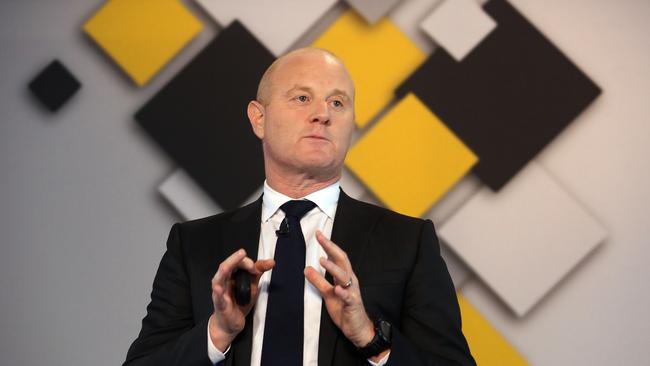
In a second round of submissions, CBA provided a spreadsheet that showed “at least seven events in relation to breaches of responsible lending obligations, two further events in relation to brokers failing to provide credit products in line with a customer’s requirements or requests, and eight further events in relation to other types of misconduct in respect of home loan applications, including falsification of documents,” Ms Orr told the commission.
CBA’s executive general manager of home buying, Daniel Huggins, is scheduled to be today’s first witness, followed by three Aussie execs — CFO Giles Boddy, general manager people Lynda Harris and GM strategy and product David Smith.
Given that after just two days of taking evidence the commission is already a day and a half behind schedule, there is no guarantee we will get to hear from all these witnesses today.
Robert Gottliebsen 8.40am: Battlers lose under Labor
The best way to show that Chris Bowen and Bill Shorten have miscalculated the impact of their franking credits thrust is to go deeper into the world of superannuation.
As I pointed out yesterday there were a significant number of people who in the last set of superannuation statistics received large franking credit refunds in their self-managed superannuation funds. These are the people the ALP are targeting.
But to receive those credits they needed to have substantial sums invested tax free in pension mode superannuation — say over $5 million.
But Scott Morrison limited the amount of money you could have in superannuation tax free pension mode to $1.6 million. In other words he confined the vast majority of the franking tax credit refunds to the battlers who were struggling to fund retirement in an environment of low interest rates.
Read more
7.45am: ASX tipped to open lower
The Australian share market is expected to open lower after US stocks lost ground on renewed fears of a trade war, as the US government indicates it would target Chinese imports.
At 7am (AEDT), the Australian share price futures index was down five points, or 0.08 per cent, at 5,934.
In the US, stocks fell on Wall Street after President Donald Trump sought to impose fresh tariffs on China, pressing it to cut its trade surplus with the United States by $US100 billion ($A126.9 billion).
The Australian share market yesterday closed lower after investor confidence was dented by US President Donald Trump’s surprise sacking of his secretary of state, Rex Tillerson.
The benchmark S & P/ASX200 index was down 39.4 points, or 0.66 per cent, at 5,935.3 points, while the broader All Ordinaries index was down 34.5 points, or 0.57 per cent, at 6,042.6 points.
The Australian dollar on this morning was marginally higher despite falls on Wall Street, still getting support from strong local consumer confidence data released on Wednesday and faster Chinese industrial production growth At 7am (AEDT), the local currency was worth US78.81 cents, up from US78.75 cents yesterday.
AAP
7.25am: Wall St hit by trade worries
Shares of industrial and materials firms pushed the Dow Jones Industrial Average and S & P 500 lower for the third straight session, as investors weighed new signs that protectionist trade policies could spread.
The Trump administration is pressing China to cut its trade surplus with the United States by $US100 billion, the White House said. Donald Trump is looking to levy tariffs on up to $US60 billion of Chinese imports, targeting the technology, telecom and apparel sectors, sources told Reuters.
Stocks had come under pressure earlier in the month as investors worried that US tariffs on steel and aluminium could hurt firms that use the metals to manufacture goods. And some are concerned that other countries might retaliate, slowing international trade and eventually weakening global economic growth.
While the White House appeared to soften its initial stance on trade policy last week, helping stocks recoup some of their losses, stocks and bond yields came under pressure after the Commerce Department signalled that few product exclusions to the tariffs would be granted to US firms.
Germany’s newly re-elected chancellor, Angela Merkel, also said the European Union needs to respond with one voice to the US tariffs and shouldn’t be afraid to impose its own trade measures if necessary.
“It just seems like the market is kind of resigning itself to this trade war narrative,” said Yousef Abbasi, global market strategist at JonesTrading. “Sentiment is fragile right now.”
The Dow Jones Industrial Average closed down 249 points, or 1 per cent, at 24758, after opening higher. The S & P 500 dropped 0.6 per cent, while the Nasdaq Composite declined 0.2 per cent.
Australian stocks are tipped to edge lower at the open. At 7.20am (AEDT) the SPI futures index was down seven points.
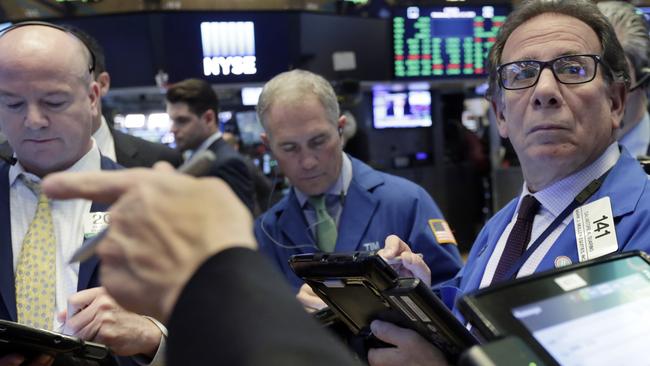
Despite renewed trade worries, US stocks have largely recovered from last month’s volatility that sent the S & P 500 and Dow industrials into correction territory as concerns about an overheating economy and higher interest rates have eased.
Some investors fear that significantly higher inflation will give the Federal Reserve a freer hand to raise rates more quickly than anticipated, pushing up bond yields and making stocks less attractive.
However, recent data has pointed to more measured economic growth that some think should keep the central bank on a gradual path. Some analysts said division among investors over interest-rate increases will continue contributing to market swings.
Overnight, the Labor Department said a gauge of US business prices rose 0.2 per cent in February, a sign of modest inflation pressure. Americans cut spending at retailers in February for the third consecutive month despite receiving bigger paychecks, the Commerce Department said.
Yesterday’s consumer-price index data showed inflation cooled slightly for American consumers last month, keeping the Fed on track to raise short-term interest rates next week, but relieving it of pressure to take more dramatic action.
The yield on the benchmark 10-year US Treasury note slipped to 2.815 per cent from 2.848 per cent a day earlier. It has fallen since approaching 3 per cent last month. Yields fall as prices rise.
Dow Jones
7.23am: Trump picks Kudlow as economic aide
President Donald Trump has chosen Larry Kudlow to be his top economic aide, elevating the influence of a longtime fixture on the CNBC business news network who previously served in the Reagan administration and has emerged as a leading evangelist for tax cuts and a smaller government.
Mr Kudlow said he has accepted the offer, saying the US economy is poised to take off after Trump signed $1.5 trillion worth of tax cuts into law.
“The economy is starting to roar and we’re going to get more of that,” he said.
Mr Kudlow will join an administration in the middle of a tumultuous remodelling as a wave of White House staffers and top officials have departed in recent weeks. Mr Trump yesterday dumped his secretary of state, former Exxon Mobil CEO Rex Tillerson.
The famously pinstripe-suited Mr Kudlow would succeed Gary Cohn, a former Goldman Sachs executive who is leaving the post in a dispute over Trump’s decision to impose tariffs on imported steel and aluminium.
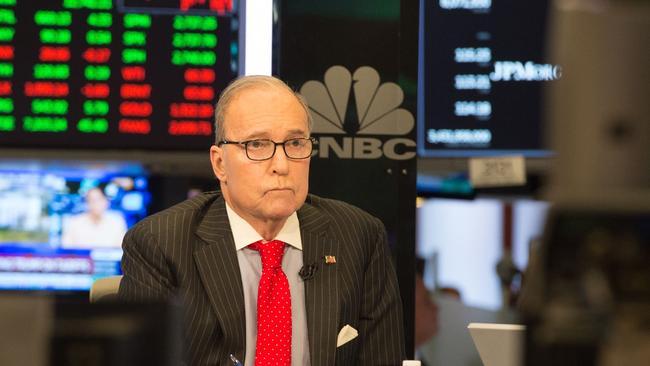
With Mr Trump’s tax cuts already being implemented, Mr Kudlow would be advising a president who appears increasingly determined to tax foreign imports — a policy Mr Kudlow personally opposes.
Mr Kudlow said he is “in accord” with Trump’s agenda and his team at the White House would help implement the policies set by the president.
AP
7.20am: Trump pursues India at WTO
The United States says it is taking action at the World Trade Organisation against Indian export subsidies as Washington’s intensifying trade offensive moved to encompass two of Asia’s largest economies.
The action opened a new front in President Donald Trump’s confrontations with major trading partners and followed his punishing new import tariffs, with officials warning that more may come soon.
Documents also revealed the United States has proposed WTO reforms that would punish members for violating basic rules, a move that appeared aimed squarely at China — a country the Trump administration has said is not a market economy and does not deserve membership in the multilateral organisation.
The White House is also considering slapping tariffs on billions of dollars in Chinese imports, particularly in the tech and telecommunications sector, in response to allegedly improper practices involving American intellectual property.
AFP
6.45am: Dollar flat
The Australian dollar is only marginally higher, as falls on Wall Street weigh on the currency, after US President Donald Trump moved to impose new tariffs on China, raising fears of a trade war.
At 6.35am (AEDT), the local currency was worth US78.83 cents, up from US78.75 cents yesterday.
The US government is pressing China to cut its trade surplus with the US by $US100 billion, the White House says.
Westpac head of NZ strategy Imre Speizer said a traders were in a risk averse mood overnight.
“US tariff proposals targeting China, a GDP prediction downgrade, and disappointing retail sales data partly explained the moves,” he said.
6.40am: World stocks soften
European and US stocks were mostly lower, relinquishing early gains, as global tensions over trade took their toll on investor confidence.
Political worries sparked by the latest shake-up in US President Donald Trump’s administration also prompted selling.
On the economic front, a disappointing US retail sales report for February prompted worries about the health of consumer spending, a big engine for American growth, analysts said.
News that Trump had replaced his moderate secretary of state Rex Tillerson with a foreign policy hawk fanned fears of instability in the White House and a more hard line approach to foreign affairs sent US stocks lower and Asian shares followed suit.
An attempt on both sides of the Atlantic to claw back ground faltered during the European afternoon amid what Charles Schwab analysts called “festering global trade uncertainty”.
Tillerson was replaced by CIA chief Mike Pompeo, who is an advocate of taking a hard line with China on trade and Iran.
“Musical chairs in Washington fuelled fresh concerns of instability within the Trump administration yesterday, adding to fresh worries about Russia on several fronts,” said Mike van Dulken, head of research at Accendo Markets.
“Investors, however, are demonstrating new-found thickness of skin following several years of geopolitical surprises ...” he said.
He pointed to positive economic data coming out of China helping fuel gains for shares of heavyweight mining firms listed in London.
London closed 0.1 per cent, Frankfurt ended up 0.1 per cent and Paris closed down 0.2 per cent.
AFP



To join the conversation, please log in. Don't have an account? Register
Join the conversation, you are commenting as Logout